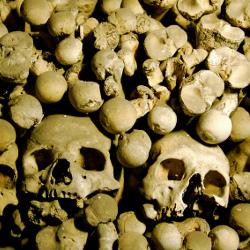
Submitted by Anna Davies on Wed, 08/01/2014 - 14:42
The annual multidisciplinary series hosted by Darwin College will examine the topic “Plagues” in the broad context of a disease or calamity of proportions that cause high morbidity or mortality with lasting impact on populations. The speakers will delve into plagues of the past, present and consider future threats to all populations that inhabit the earth.
Every Friday in Lent term (17 January to 7 March). Entrance from 16.30 for lectures at a start time of 17:30 Lady Mitchell Hall, Sidgwick Avenue, Cambridge.
Organizers: Jonathan Heeney, Sven Friedemann
Date Topic Speaker
| 17 January |
Plagues and Medicine |
Leszek Borysiewicz, University of Cambridge |
|---|
This lecture will examine how ancient plagues influenced the concepts, the discipline and the practice of medicine as we know it today. Sir Leszek will reflect on the current and future demands on the medical profession and how it will need to evolve to combat new and emerging infectious disease threats.
| 24 January |
Plagues and History |
Mary & Chris Dobson, University of Cambridge |
|---|
Plagues have changed history, stopped armies in their tracks and altered the fate of nations. Here the Dobsons will examine the consequences of plagues on human history and reflect on future challenges for our greying populations to come.
| 31 January |
Silicon Plagues | Mikko Hypponen, CRO, F-Secure & Columnist |
|---|
The digital era has created a global network and conduit for new plagues. Computer viruses, malware and spyware are not only threats to personal privacy and individual households, they constantly threaten financial institutions, government departments, and the security of nations. What are the future challenges and how can we combat them.
| 7 February | The Nature of Plagues | Angela McLean, University of Oxford |
|---|
The majority of human infections have their origins in the animal kingdom. Natural ecosystems have evolved over millennia to co-exist, but when ecosystems collide and are disturbed, dynamics change and new species are exposed to microbes for which they have inappropriate defences with potentially profound consequences if they are efficiently transmitted in new hosts.
| 14 February | Plagues, Populations & Survival |
Stephen J O'Brien, St Petersburg State University |
|---|
Darwin’s theories of natural selection and evolution have had a profound impact on science. The new genomic era has reinforced this and our ability to decipher the DNA code has revealed much about the evolution of species. Most striking the survival of the fittest from disease pandemics can be traced to genetic traits acquired by natural selection.
| 21 February |
The Human Plague |
Stephen Emmott, Microsoft Research |
|---|
How many humans was the earth built for and how many of us can it sustain? Stephen Emmott asks the hard questions about consequences about the human plague on the earth, its ecosystem and its sustainability.
| 28 February |
Plagues & Economic Collapse |
Ian Morris, Stanford University |
|---|
From the biblical plagues, to modern day plagues of insects affecting our large monoculture system of agriculture, the effects often have profound effects on the economies of nations.
| 7 March | Plagues & Metaphor | Rowan Williams, University of Cambridge |
|---|
The concept of a plague is commonly present in the world’s literature and doctrines and is influential in forming society and common values. Lord Williams will take us on a journey enlightening the intellectual and spiritual impact of plague as a metaphor.

